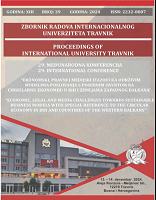УЛОГА И ПОЛОЖАЈ МЕЂУНАРОДНОГ УГОВОРНОГ ПРАВА – ПРИОРИТЕТИ И ОБАВЕЗУЈУЋЕ МОГУЋНОСТИ ЗА СЛОБОДЕ МЕЂУНАРОДНОГ УГОВОРА
THE ROLE AND POSITION OF INTERNATIONAL CONTRACT LAW - PRIORITIES AND BINDING OPPORTUNITIES FOR FREEDOMS OF INTERNATIONAL CONTRACTING
Author(s): Tose Panov, Mevledin MustafiSubject(s): Law, Constitution, Jurisprudence, Supranational / Global Economy, Business Economy / Management, International Law
Published by: INTERNACIONALNI UNIVERZITET TRAVNIK
Keywords: Agreement; obligatory law; contract; foreign element; international; business practice; convention; equality between the parties; legal order; value circulation; international contract law;
Summary/Abstract: Private international law and interstate legal character with a foreign element constitute one of the basic challenges of international contracts, in the last era they can also be known as nontraditional or electronic contracts that do not recognize borders and state sovereignty. International and electronic contracts have proven to be very functional, economical in terms of time, cost and implementation in practice for the global economy. The functional character of international contractual law, i.e. its internationalization, is a characteristic phenomenon of contemporary law for international and global economies. These new juridical-civil phenomena are opposed to the internationalization of the market in a general way where the relations between physical persons and legal entities or even individuals, for example, contracts are more and more connected between citizens of different states; foreigners can be owners of things in the territory of other states, family relations can be established between citizens of different states, as contractual relations with foreign elements are otherwise known. Freedom of contract is related to the autonomy of the will of the parties. The issue of the autonomy of the will of the parties in the framework of contractual relations has been and still remains in the sphere of debate in the philosophy of international law. A significant space of this autonomy has been given to the contemporary society and in a substantial point of view the idea of equality and freedom with foreign elements is affirmed. In liberal capitalism, free competition associated with completely liberal economic initiatives is affirmed. Therefore, the contracting party is free to assume obligations, which means that the binding power of the contract is created by the will of the parties and not by national law but by international law. Each state within the sphere of its sovereignty can autonomously decide that for some relations, the national law is applied, but the free will of the parties applies to the contractual law and enables free implementation between the parties with a foreign element.
Journal: ZBORNIK RADOVA INTERNACIONALNOG UNIVERZITETA TRAVNIK
- Issue Year: 13/2024
- Issue No: 29
- Page Range: 556-564
- Page Count: 9
- Language: Serbian

